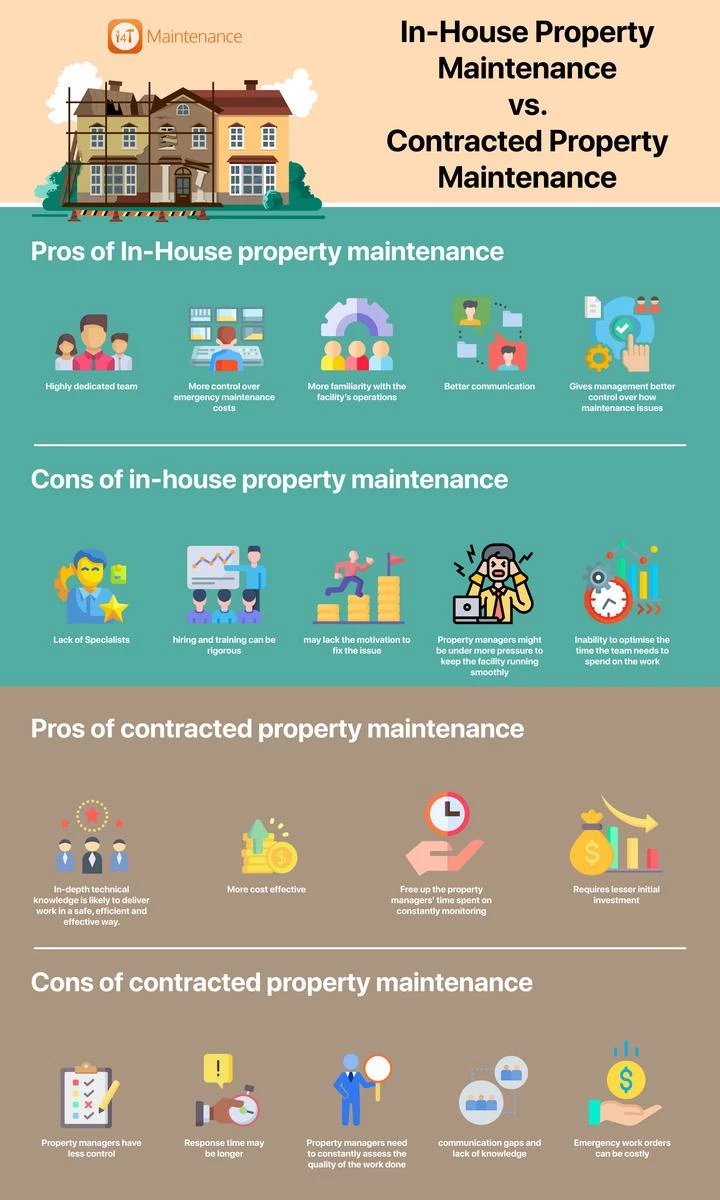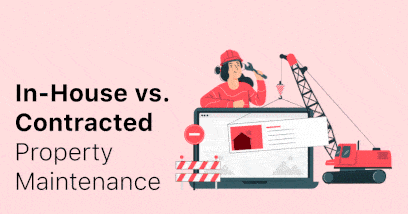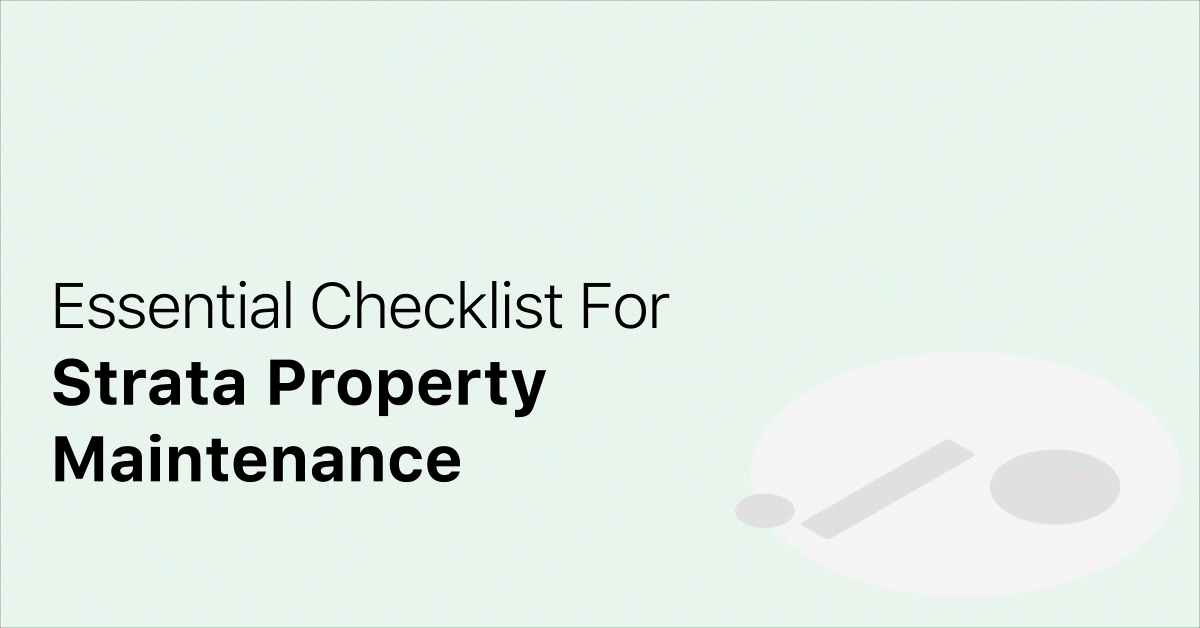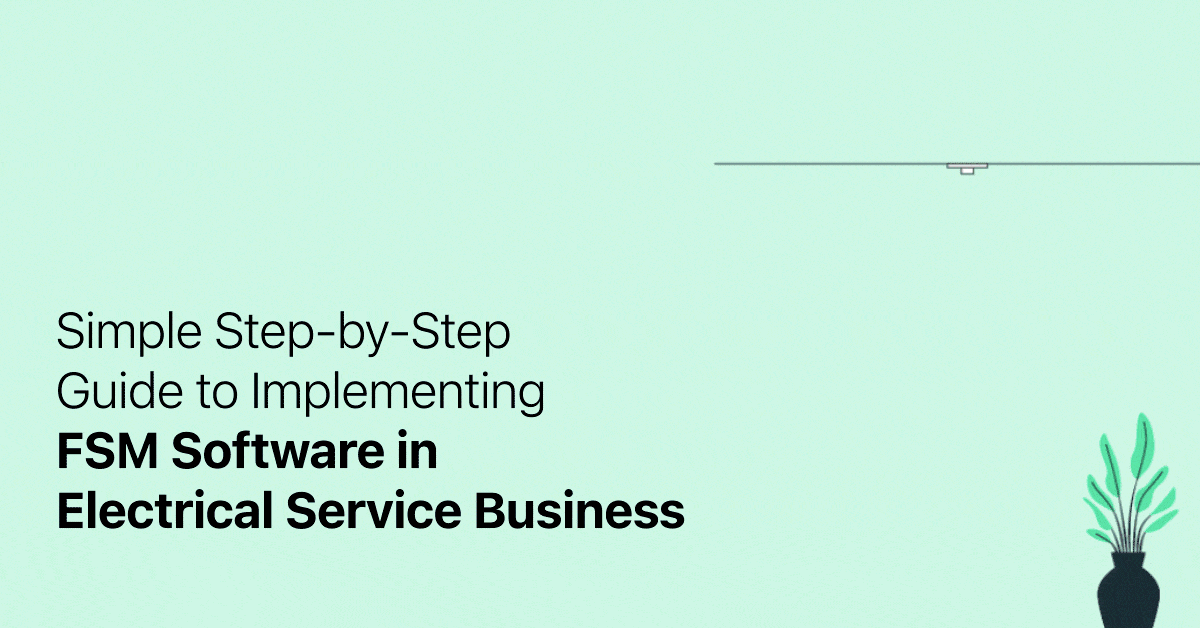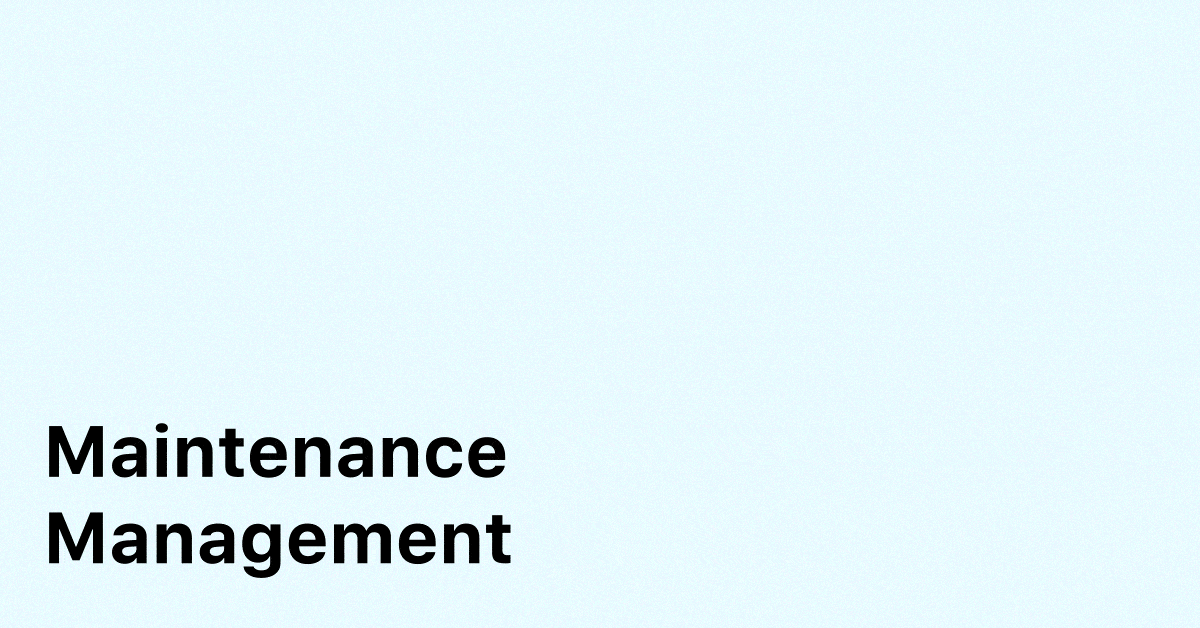Property Maintenance is carried out in order to keep the property running smoothly for as long as possible. Irrespective of how big or small your property is, maintenance remains an integral part of it. Timely maintenance keeps properties functional, efficient and safe for the occupants. Whether its residential property management or commercial, choosing between the two types of property maintenance is vital.
There are two ways of carrying out routine property maintenance. Property managers can either hire a full time property maintenance team (In-House Property Maintenance) or they can outsource it to a third party (Contracted Property Maintenance) making them responsible for maintaining the property.
Pros and cons of In-House Property Maintenance

Pros of In-House property maintenance:
- Highly dedicated team of technicians take care of any emergency repair or maintenance work on a priority basis.
- More control over emergency maintenance costs. As the team is on a payroll, chances of you ever going over-budget are generally little to none.
- More familiarity with the facility’s operations and your specific needs.
- Better communication between the property maintenance team and management personnels.
- Gives management better control over how maintenance issues are handled and what information flows out of the facility.
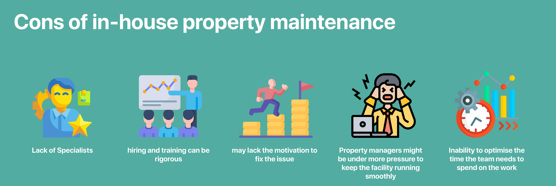
Cons of in-house property maintenance:
- In-house maintenance teams likely include technicians who are jack of all trades, rather than specialists.
- It might take a more rigorous approach to hire and train them well and can hence be more costly.
- Since they are on the payroll, they may lack the motivation to fix the issue within a specified period of time.
- Property managers might be under more pressure to keep the facility running smoothly round the clock. This is because they have a dedicated team at their disposal at all times.
- Inability to optimise the time the team needs to spend on the work. This means you pay for the salaries and benefits even when no work is being done.
Pros and cons of Contracted Property Maintenance
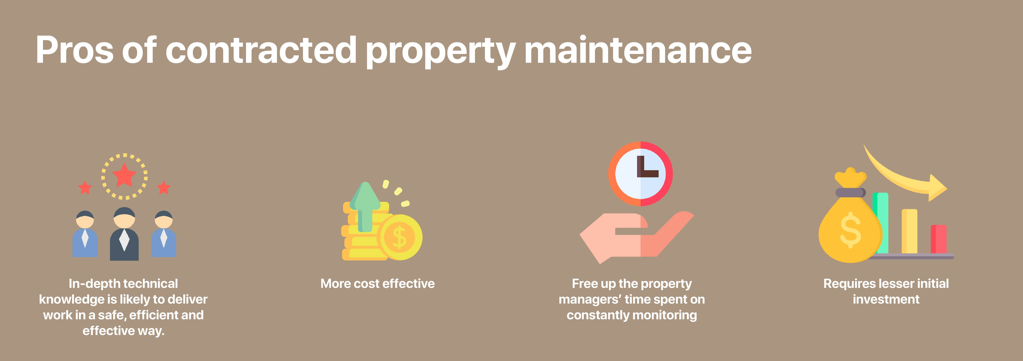
Pros of contracted property maintenance:
- In-depth technical knowledge is likely to deliver work in a safe, efficient and effective way.
- More cost effective as the property owner only has to pay for the maintenance work as and when needed.
- Free up the property managers’ time spent on constantly monitoring the facility for maintenance work. This is because as now the person in-charge is the contractor. They can instead focus on the core operations of running the property/facility.
- Requires lesser initial investment to hand over all the maintenance work to contracted professionals. Now you can entirely skip spending on hiring, retaining and managing internal staff.

Cons of contracted property maintenance:
- Property managers have less control over how the work is being carried out. Additionally, they may also risk sharing internal information with a third party.
- Response time may be longer as your facility might not be the only one they are handling. Hence, they might not give priority to your work.
- Property managers need to constantly assess the quality of the work done, as some may just be interested in getting paid.
- In case of emergency work orders, property managers might find themselves thrown off their budget track. This is because contractors cost more to fix the issue on an urgent basis.
- Due to communication gaps and lack of knowledge of a given facility’s workflows, there are chances of a mismatch between expectations.
Should you go for In-House or Contracted Property Maintenance?
Property maintenance is a moving target. Unless your business is a start up, you might already have a property maintenance guideline in place to follow. However, whether to choose in-house property maintenance or to outsource it, can sometimes be the toughest decision to pinch down.
Consider asking yourself:
- How complex is the equipment that needs to be maintained?
- What is the cost of maintenance for each option?
- Do you have enough work to hire and keep a dedicated team all the time?
- How skilled and equipped is your in-house staff compared to the contractor?
- What is the response time for each option in case of an emergency repair?
- Does a hybrid of both maintenance types work for your business?
- Do you have the capability to improve in-house maintenance rather than approaching a contractor?
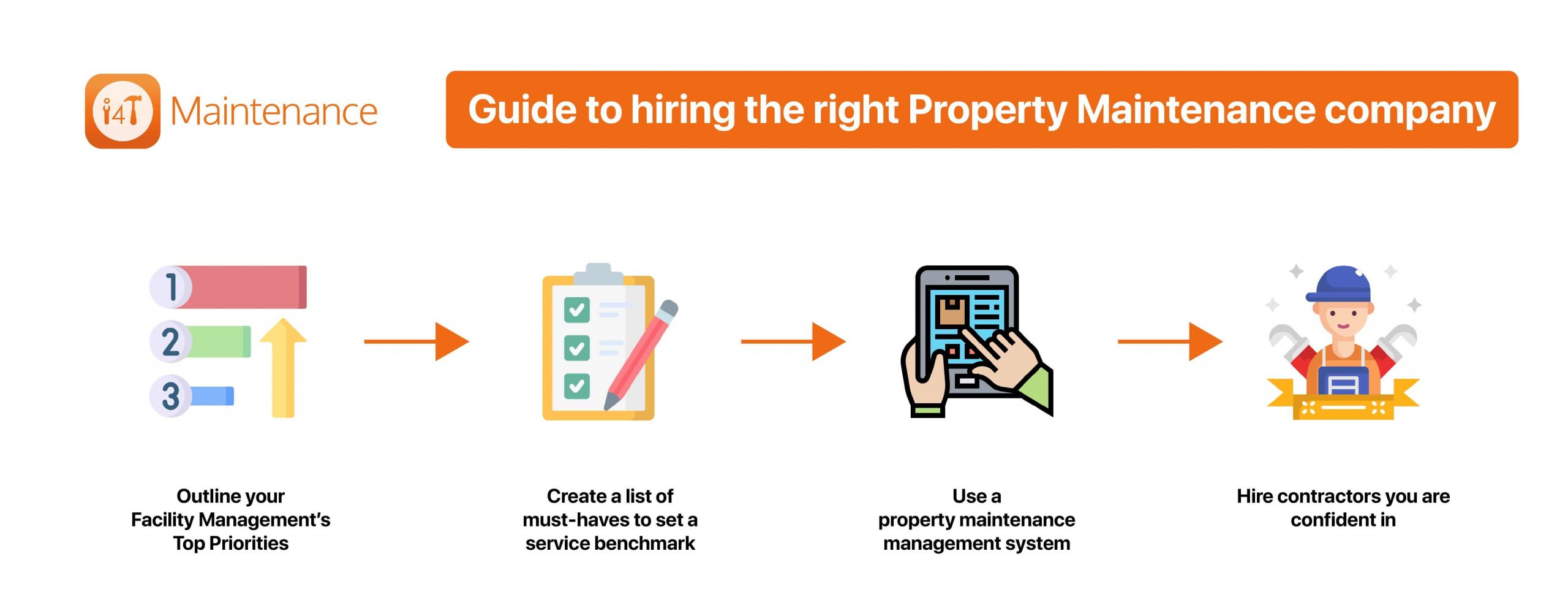
Guide to hiring the right Property Maintenance company
A property maintenance company is hired by a property manager incharge of keeping the premises functional and secure at all times. However, the process of vetting the right maintenance provider can be extensive and time consuming.
Here are a few guidelines for you to follow when deciding which contracted property maintenance service provider best fits your needs.
Outline your Facility Management’s Top Priorities
- Ensuring occupant’s safety and satisfaction
- Introducing processes that are efficient and lowers maintenance costs
- Avoiding poor quality service, accidents and mistakes at all costs.
- Cut down maintenance costs and offer fast and reliable service.
- Keep landlords satisfied with minimum service requests via preventative maintenance.
Create a list of must-haves to set a service benchmark
- Appropriate and valid licences and certifications.
- Efficient and responsive to property maintenance requests even at odd hours.
- Equipped with the right tools, skills and expertise to carry out the work.
- Availability and not already having too many facilities to take care of.
- Professionalism and having a good work ethic.
- Willing to provide you with references upon request.
- Willingness to use property maintenance management software in order to efficiently work assigned work orders.
- Able to scale up and service more properties as your portfolio grows.
Use a property maintenance management system
No matter how vetted your contractors are or how committed you are as a property manager, there will always be things that go unplanned. On some days there will be too many maintenance requests for you to handle. On other days your contractor might simply forget that they had your work order in the pipeline.
A property maintenance management software will ensure all of your processes are streamlined. You will see that now your work orders are dispatched to and accepted by service suppliers in a timely manner. It also lets you track progress, meet compliance requirements and evaluate quality of work delivered.
Also, get your contracted supplier to use your selected maintenance management software so information sharing becomes much more efficient.
Hire contractors you are confident in
- Always cross check with other property managers for references to determine credibility and service quality.
- Ensure they understand your core values and what are your expectations in terms of service delivery and payment terms.
- Ensure they have enough maintenance technicians to be available when needed.
- Make sure to go through their website and social media presence. Get to know them better on metrics that are hard to cover through other vetting methods.
- Gauge them on qualities such as work ethic, reliability, commitment, communication skills, thoroughness and attention to detail,
What's included in a Property Maintenance Contract
A property maintenance contract is a written agreement between the property manager and the maintenance service supplier. The agreement is to carry out the maintenance of a facility in exchange for an agreed upon compensation.
Having a property maintenance contact is important as it lays out timelines, requirements, expectations and costs.
Common things included in a maintenance contract includes:
- Contact information of the maintenance provider and the property manager
- Definitions of frequently referred terms
- Service terms and exclusions
- Response times, frequency of service and support services
- Invoicing and payment terms
- Warranties and disclaimers
- Obligations, penalties and course of action under certain circumstances
- Contract start and end date along with signatures of both parties
- Conditions of contract termination
- Guidelines for handling legal disputes and how each party will stand liable
It’s important to note that the maintenance contracts can vary depending upon the kind of service you require.
You can sign a maintenance contract for any of the following:
- Facility maintenance
- Cleaning and upkeep of the building
- Repair and maintenance of equipment/systems
- Fleet maintenance
Final thoughts
Both In-House and Contracted Property Maintenance have their upsides and downsides. Your business’ internal capabilities, budget, complexity and other requirements determine which option is the best.
Hybrid property maintenance is yet another approach you can explore. In this approach, you deploy internal teams where it makes most business sense and contact specialists for highly complex systems.
